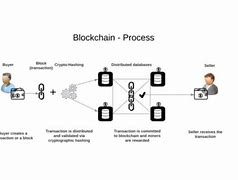
Ever heard the term “blockchain” floating around but felt a little lost trying to understand it? Don’t worry, you’re not alone. It’s one of those things that seems complicated at first, but once you wrap your head around it, you realize it’s actually quite fascinating & has the potential to revolutionize the way we interact with the world.
In a nutshell, blockchain is a digital ledger that records transactions in a secure and transparent manner. Think of it as a shared record book, distributed across a network of computers. Each transaction is recorded as a “block,” which is then linked to the previous block in the chain, creating an immutable and chronological record of all transactions. This means that once something is added to the blockchain, it can’t be altered or removed, making it extremely secure & reliable.
So, why should you care? Because blockchain has the potential to revolutionize many industries, from finance & healthcare to supply chain management & voting. It’s all about increasing transparency, security, and efficiency. We’ll explore these potential uses & how they could change our future in this guide. So, buckle up & let’s dive into the world of blockchain!
Related Post : Trending Now: Apps Set to Transform Your Travel Experience
Understanding Blockchain: A Quick Guide to Its Applications and Uses
Blockchain technology has emerged as a revolutionary force, transforming various industries and redefining how we interact with data and information. This groundbreaking technology has the potential to reshape our digital landscape, offering unprecedented levels of security, transparency, and efficiency. This guide will offer a thorough overview of blockchain, delving into its core principles, key applications, and the potential it holds for the future.
What is Blockchain?
At its core, blockchain is a distributed, immutable ledger that records transactions across a network of computers. It operates as a decentralized system, meaning there is no single central authority controlling it. Each transaction is grouped into a “block,” and these blocks are linked together chronologically to form a “chain.” This chain serves as a permanent and transparent record of all transactions, making it a highly secure and verifiable system.
A Decentralized System
One of the defining attributes of blockchain is its decentralized nature. Unlike traditional systems that rely on a central authority, blockchain operates on a peer-to-peer network. This eliminates the need for a single point of control, making it resistant to censorship and manipulation. Each node in the network maintains a copy of the blockchain, ensuring its integrity and preventing any single entity from altering the data.
A Secure and Transparent Ledger
Blockchain utilizes cryptography to secure transactions and ensure their immutability. Each block is cryptographically linked to the previous one, creating a tamper-proof chain. Any attempt to alter a block would require altering all subsequent blocks, which is practically impossible due to the decentralized nature of the network. This inherent security makes blockchain highly resistant to fraud and manipulation.
A Chain of Blocks
The term “blockchain” itself refers to the structure of the data. Each block contains a set of transactions, along with a timestamp and a hash of the previous block. These blocks are linked together chronologically, creating a chain of data. This chain serves as a complete and immutable record of all transactions that have occurred on the network.
How Transactions Work
Transactions on a blockchain are initiated by users and then verified by a network of computers. These computers, known as nodes, collectively validate the transaction and add it to the blockchain. This process involves a consensus mechanism, where nodes agree on the validity of the transaction before it is permanently recorded.
Key Applications of Blockchain:
Blockchain technology has a wide scope of applications, impacting various sectors and driving innovation. Here are some of the key areas where blockchain is making a significant impact:
Cryptocurrencies
Blockchain has revolutionized the financial landscape with the emergence of cryptocurrencies. Bitcoin, the first and most popular cryptocurrency, utilizes blockchain technology to record and verify transactions. This decentralized system eliminates the need for intermediaries, such as banks, enabling peer-to-peer payments.
Bitcoin and its Evolution
Bitcoin’s introduction in 2008 marked a paradigm shift in the financial world. Its decentralized nature, resistance to censorship, and secure transaction system gained widespread attention. Since then, Bitcoin has evolved significantly, becoming a global asset class and a catalyst for innovation in the financial sector.
Other Popular Cryptocurrencies
The achievement of Bitcoin has paved the way for a plethora of other cryptocurrencies, each with its unique attributes and applications. Ethereum, Ripple, Litecoin, and Binance Coin are among the most popular cryptocurrencies, offering diverse solutions in areas like smart contracts, decentralized finance, and cross-border payments.
The Future of Cryptocurrency
The cryptocurrency landscape is continuously evolving, with new innovations and applications emerging. The future of cryptocurrency holds immense potential for disrupting traditional financial systems, fostering financial inclusion, and driving further innovation in the digital economy.
provide Chain Management
Blockchain is transforming provide chain management by providing enhanced transparency and traceability. By recording each stage of a product’s journey, from origin to delivery, blockchain enables businesses to track goods, verify authenticity, and improve overall efficiency.
Transparency and Traceability
Blockchain creates an immutable record of all transactions in a provide chain, making it possible to trace the origin and history of products. This transparency enhances accountability and allows businesses to determine potential issues or inconsistencies throughout the provide chain.
Reducing Counterfeiting
The tamper-proof nature of blockchain makes it an effective tool for combating counterfeiting. By recording the origin and movement of goods, blockchain can help businesses and consumers verify the authenticity of products and prevent the circulation of counterfeit goods.
Optimizing Efficiency
Blockchain streamlines provide chain operations by providing real-time visibility into inventory levels, shipment status, and other critical data. This allows businesses to maximize inventory management, reduce delays, and improve overall efficiency.
Healthcare
Blockchain is revolutionizing the healthcare industry by enabling secure and efficient data sharing, improving patient privacy, and enhancing drug traceability.
Secure Patient Records
Blockchain offers a secure platform for storing and managing patient records. By encrypting and storing data on a distributed ledger, blockchain ensures that patient information is protected from unauthorized access or tampering.
Efficient Data Sharing
Blockchain facilitates secure and efficient data sharing between healthcare offerrs, allowing patients to control their medical records and grant access to authorized parties. This enables faster and more accurate diagnosis and treatment.
Drug Traceability
Blockchain can be used to track the movement of drugs throughout the provide chain, ensuring their authenticity and preventing counterfeiting. This is particularly crucial for life-saving medications, where counterfeits can have severe consequences.
Voting Systems
Blockchain technology offers a secure and transparent solution for conducting elections. By leveraging the immutability and decentralization of blockchain, voting systems can become more secure, reliable, and transparent.
Secure and Tamper-Proof Voting
Blockchain offers a tamper-proof record of votes, making it virtually impossible to manipulate or alter election outcomes. This enhances trust in the electoral process and ensures the integrity of votes.
boostd Voter Participation
Blockchain can simplify the voting process, making it easier for people to register and cast their votes. This could potentially boost voter participation and engagement in elections.
Eliminating Fraud
The decentralized and secure nature of blockchain makes it difficult for fraudsters to manipulate or alter voting records. This helps to eliminate voter fraud and ensure the fairness of elections.
Identity Management
Blockchain technology is transforming the way we manage identities, offering secure and verifiable digital identity solutions.
Digital Identity Solutions
Blockchain enables the creation of secure and verifiable digital identities. These identities can be used for various purposes, including accessing online services, verifying credentials, and proving identity.
Secure and Verifiable Credentials
Blockchain can be used to store and verify credentials, such as academic degrees, professional licenses, and employment records. This eliminates the need for paper-based certificates and offers a secure and verifiable record of credentials.
Decentralized Identity Management
Blockchain enables the creation of decentralized identity management systems, where individuals have control over their own data and can select which information to share. This empowers individuals and boosts privacy.
benefits of Using Blockchain:
The adoption of blockchain technology brings numerous benefits across various sectors. Some of the key benefits of using blockchain include:
Security and Transparency
Blockchain offers a highly secure and transparent platform for recording and verifying transactions. Its decentralized nature and cryptographic security make it difficult to tamper with or alter data, ensuring the integrity and reliability of information.
Immutability
Once a transaction is recorded on a blockchain, it is permanent and immutable. This immutability makes blockchain an ideal platform for maintaining reliable records and ensuring accountability.
Decentralization
Blockchain operates on a decentralized network, eliminating the need for a central authority. This decentralization makes it resistant to censorship, manipulation, and single points of failure.
boostd Efficiency and Trust
Blockchain streamlines processes, automates tasks, and reduces the need for intermediaries. This leads to boostd efficiency, reduced costs, and enhanced trust among stakeholders.
Challenges of Blockchain:
While blockchain offers numerous benefits, it also faces several challenges that need to be addressed for its widespread adoption.
Scalability
One of the major challenges facing blockchain is scalability. As the number of transactions boosts, the network can become congested, leading to slower processing times and higher transaction fees.
Regulation and Legal Frameworks
The decentralized nature of blockchain raises regulatory and legal concerns. Governments and regulatory bodies are still working to develop clear frameworks for governing blockchain technology and its various applications.
Energy Consumption
Some blockchain networks, such as Bitcoin, are energy-intensive due to the computational power required for mining and verifying transactions. This energy consumption raises environmental concerns and needs to be addressed.
The Future of Blockchain:
The future of blockchain holds immense potential for innovation and disruption across various industries.
Emerging Technologies
Blockchain technology is constantly evolving, with new innovations emerging, such as smart contracts, decentralized finance, and interoperability solutions. These advancements are expanding the capabilities of blockchain and opening up new possibilities.
Adoption by Mainstream Businesses
As blockchain technology matures and its benefits become more widely recognized, we can expect to see boostd adoption by mainstream businesses across various sectors. This will lead to a greater integration of blockchain solutions into existing business models.
The Impact on Industries
Blockchain has the potential to transform industries by enhancing efficiency, transparency, and security. This will create new opportunities, disrupt existing business models, and reshape the economic landscape.
Conclusion:
The impact of blockchain technology on the world is undeniable. It is transforming industries, revolutionizing finance, and creating new opportunities. Understanding the basics of blockchain is crucial for navigating this ever-evolving landscape. As we move forward, we can expect to see even more innovative applications of this transformative technology.



